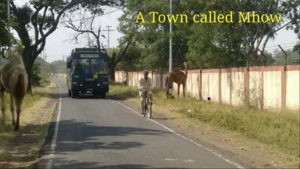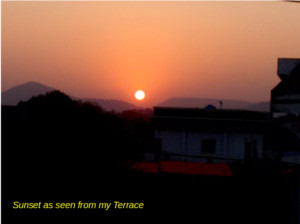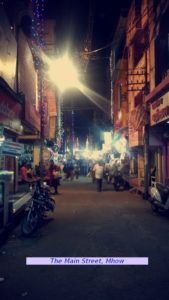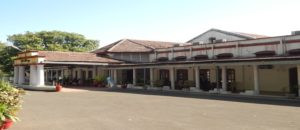To quote Louis Fischer,
What is lesser known is the other journey that transformed Gandhi’s life and indirectly India’s destiny was another rail journey Gandhiji undertook in 1904.
Again to quote Louis Fischer,
My life is my message
To Live,To Love, To learn, To Leave a Legacy
Anyone with a nodding acquaintance with the life of mahatma Gandhi would be familiar with the story of Gandhiji being unceremoniously thrown out from a First Class Compartment in South Africa. To quote Louis Fischer, ………….The incident occurred at At Maritzburg, the capital of Natal, in 1893.Gandhi could have returned to the train … Continue reading “The Other Train Journey in SA”
To quote Louis Fischer,
What is lesser known is the other journey that transformed Gandhi’s life and indirectly India’s destiny was another rail journey Gandhiji undertook in 1904.
Again to quote Louis Fischer,
My life is my message
How often have I been asked ? A south Indian, how come you have settled down at Mhow? I have no clear answers . But every time I hear such a question, it triggers a series of thoughts on the uniqueness of Mhow. As a fauji I have been through 23 different places … Continue reading “A Town Called Mhow”

How often have I been asked ? A south Indian, how come you have settled down at Mhow? I have no clear answers . But every time I hear such a question, it triggers a series of thoughts on the uniqueness of Mhow.

 My wife had been lugging around an old Sumit mixer grinder , absolutely functional but one crucial knob missing. The machine was so obsolete no spares were available anywhere. That was before we reached Mhow. A 10 ft by 12 ft shop with a know-all , do-all owner, with a ‘koi dikkat nahin ‘ attitude found the right solution in no time . It is not just the jugaad for repairing stuff , they can also produce such stuff found only in elite stores. I was looking for a ‘quiche tray’ and the same shop-keeper produced it seemingly out of nowhere. (I had only recently learnt the word ‘quiche’ but as a shop-keeper of Main street , Mhow he was fully aware of the the contraption as an essential need of a fauji mem-saab.)
My wife had been lugging around an old Sumit mixer grinder , absolutely functional but one crucial knob missing. The machine was so obsolete no spares were available anywhere. That was before we reached Mhow. A 10 ft by 12 ft shop with a know-all , do-all owner, with a ‘koi dikkat nahin ‘ attitude found the right solution in no time . It is not just the jugaad for repairing stuff , they can also produce such stuff found only in elite stores. I was looking for a ‘quiche tray’ and the same shop-keeper produced it seemingly out of nowhere. (I had only recently learnt the word ‘quiche’ but as a shop-keeper of Main street , Mhow he was fully aware of the the contraption as an essential need of a fauji mem-saab.)
An ancient defence service officers institute coupled with modern libraries, gymnasiums , tennis and squash courts, an olympic size swimming pool, a sprawling golf course and most importantly the ambiance of Mhow-bazaar has made this place truly a haven for a retired fauji.

In the era of social media , it has become the trend to share ‘Quotes’ . Find out what you want to say, then check out who has said a similar thing, modify it a bit and it will carry more weight. I have done a subtle experiment on Facebook ,don’t tell anyone, to embellish … Continue reading “Quote Unquote”
This question has been bugging me ever since I could afford to buy a cell-phone. I managed to delay it for as long as possible, but sometime around 2006, sitting at a remote place in North Bengal with non-existent or poor STD services, kind of forced me to hook on to the cellphone network. Now … Continue reading “Do I really need a Cell-phone”
Over the years , the device size has been getting smaller and smaller and presto, suddenly there is a U Turn and the evolution is in the opposite direction. Here’s a cartoonist’s view of the point of inflection
How can you move around without google maps ?
– I agree , google maps are useful when you are in a strange city, but how often do you need to navigate to your wash room ?
How do you keep in touch with your children ?
-well, I use the land-line, instant messengers or email while I am sitting at office or home and while on move, it really doesn’t matter if one is out of reach for an hour or two .
Don’t you miss it when , say, receiving someone at air port or railway station ?
It was circa 1990, during the address to officers by the COAS at DSSC Wellington, one infantry officer had the temerity to suggest that something be done about providing better opportunities to infantry officers for nomination to attend DSSC Course at Wellington. He further explained that the Staff Course had become so important for … Continue reading “A Tale of two Chiefs”
Well, the Chief went ballistic; some raw nerve had been touched. He himself was a gunner and an air op officer . When he took over as the Chief, a leading National daily , had wondered as to how a battle hardened Force like the Indian Army had thrown up a Chief without any battle experience. The General was known for his strategic thinking rather than for soldiering. Mandal Commission was the then rage, across the country. He thundered, “I do not want mandalization in Army, we cannot have a quota system for infantry” . After a long, seemingly never ending diatribe he declared “ we have a fair system and anyone can reach the higher ranks”
He happens to be the first non-psc Chief. Well, we have come a full circle.
These are times when it is difficult to find someone who is not keenly interacting with a smart phone, be it in a cafeteria or a classroom. Even people of my age, have become ‘touch-savvy’ , if not ‘tech-savvy’. Guys who have problem understanding whats an app, understand and use ‘WhatsApp’ … Continue reading “Appy Times”
These are times when it is difficult to find someone who is not keenly interacting with a smart phone, be it in a cafeteria or a classroom. Even people of my age, have become ‘touch-savvy’ , if not ‘tech-savvy’. Guys who have problem understanding whats an app, understand and use ‘WhatsApp’
 While our whatsApp group had an average of 150 posts a day along with all kinds of media, the website was like the NDA library, where none ventured unless forced to.
While our whatsApp group had an average of 150 posts a day along with all kinds of media, the website was like the NDA library, where none ventured unless forced to.Why tolerance can be dangerous ? There is lot of talk about lack of tolerance. Is tolerance really a virtue ? so it seems . Let us look at the dictionary meaning of tolerance. the ability or willingness to tolerate the existence of opinions or behaviour that one dislikes or disagrees with. the … Continue reading “Why Tolerance can be Dangerous”
 Where does the word ‘tolerance’ fit in ? Whenever there is dislike, disagreement and conflicts, tolerance at best can be an intermediate stage before the stage of ‘acceptance ‘ is reached . To that extent ,it is better than ‘intolerance’; but tolerance cannot ever be an end by itself and a total divorce may actually be better than a ‘permanent state of tolerance’.
Where does the word ‘tolerance’ fit in ? Whenever there is dislike, disagreement and conflicts, tolerance at best can be an intermediate stage before the stage of ‘acceptance ‘ is reached . To that extent ,it is better than ‘intolerance’; but tolerance cannot ever be an end by itself and a total divorce may actually be better than a ‘permanent state of tolerance’. As a veteran, do I want or, more importantly, do I need OROP ? To be more precise, do I need that extra money ? I don’t think so. It is a soldier’s dignity that take a beating , when he is back among civilians in the society. Money is really is of no consequence. … Continue reading “OROP, What it means to me”
As a veteran, do I want or, more importantly, do I need OROP ?
Money is really is of no consequence. Any amount of money is insufficient if the society robs you of your dignity and honour.
That is the way army was when I joined. It was considered too ‘bania-like’ to have a second look at your pay statement. A pay statement (pay slip as it is called ) was routinely torn up after seeing the figure ‘remittance to bankers’. Today it may sound foolhardy. But it is not unique to Indian Army. Warriors all over the world disdain money, it is only the banias or bandits who accumulated wealth(banias did it without weapons and bandits did it with weapons).Japanese concept of Bushido explains it best. Here’s an extract from the book BUSHIDO THE SOUL OF JAPAN BY INAZO NITOBÉ, A.M., Ph.D.
………He disdains money itself,—the art of making or hoarding it. It is to him veritably filthy lucre. Niggardliness of gold and of life excites as much disapprobation as their lavish use is panegyrized. “Less than all things,” says a current precept, “men must grudge money: it is by riches that wisdom is hindered.” Hence children were brought up with utter disregard of economy. It was considered bad taste to speak of it, and ignorance of the value of different coins was a token of good breeding. Knowledge of numbers was indispensable in the mustering of forces as well, as in the distribution of benefices and fiefs; but the counting of money was left to meaner hands………..
We never complained about not getting our due , for the simple reason we hardly knew what was our due. While on leave, I was surprised to find that my civilian friends not only knew the current DA rate but were also aware of the next one. That explains why OROP was not talked about for four decades.
On the other hand, Dignity and respect were valued a lot. One only had to see a military special train , where compartments are marked “officers mess’ ‘Tiger’, Lion and so on. Even in the middle of a jungle, a clearing where the CO’s tent was put up attained the status of a bungalow. Furnishing was done with available material like logs , planks and grass. It resembled the den of ‘Hagar the Horrible’ but far from complaining about, we were proud of the arrangements. It was termed ‘jungal men mangal’.
Lack of money did not affect the dignity of a soldier when he returned home after completing 15 years of service. He had a place in the society. Education and medical expenses were less or non existent. After all army had one of the best networks of hospitals and medical centres.
The liberating nineties , as Gurcharan das calls it changed all that. It was extremely difficult for a fauji to seek admission for his children in private educational institutions and treatment at private hospitals became out of reach. Even to die with dignity it cost money. I could not leave army as I had no civil qualifications and people at the universities and colleges wanted you to apply a year before and go through the process of entrance exams and enrolment. I actually met the Vice Chancellor of Madras University . I thank him for agreeing to meet me without prior appointment, but the rules quoted by him were absurd to me. How can these babus, who have not served in army ever understand how difficult it is when posted at Tawang or Poonch to go through this one year process. No sir, I did not want money, I just wanted an opportunity to study, upgrade my skills to suit the civilian life.
An army man misses the opportunities to invest, to upgrade his skills or simply learn the way of life in civil environment. And it happens due to his spending the most productive years at the borders or at sea, not through chasing money at Gulf countries or a better life style in the West.
Having served for 35 years in a Regiment and having frozen to attention every time the Regimental March past played, all I remember is a feeling of intense pride and a deep respect for the Flag and the Regiment when I heard these notes. Back O Bennachie is our Regimental March-past. Though I never learnt … Continue reading “Scottish Tunes and the Desi Regiments”
Having served for 35 years in a Regiment and having frozen to attention every time the Regimental March past played, all I remember is a feeling of intense pride and a deep respect for the Flag and the Regiment when I heard these notes.
For whatever reason , the song is set to a lively tune. Today, it appears to be a huge joke; it could well have been ‘Mary had a little lamb’ . What comes to my mind is the words of Jiddu Krishnamurti that seemingly meaningless rituals and words can become profoundly sacred through repetition over a period of time.It was something I had read long back, but courtesy, ‘the net’, I reproduce it below.
…….By repeating Amen or Om or Coca-Cola indefinitely you will obviously have a certain experience because by repetition the mind becomes quiet. It is a well known phenomenon which has been practised for thousands of years in India – Mantra Yoga it is called. By repetition you can induce the mind to be gentle and soft but it is still a petty, shoddy, little mind. You might as well put a piece of stick you have picked up in the garden on the mantelpiece and give it a flower every day. In a month you will be worshipping it and not to put a flower in front of it will become a sin……
Some links to lyrics and videos (The song is called ‘ back o bennachie’ or ‘gin I were the gadie rins’ )
“Uparwala sab dekh raha hai” the saying is as old as the hills, but what’s new in the TV commercial is that ‘Uparwala’ here refers to ‘CP Plus’ CCTV. Earlier days, a child was told “God sees all, knows all, is all powerful and he knows what you are up to , anywhere, any time, … Continue reading “Is Technology the new God ?”